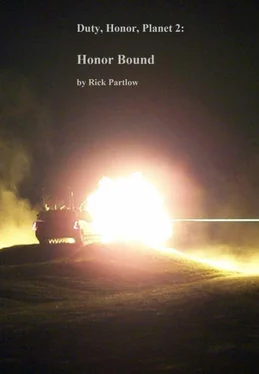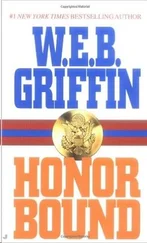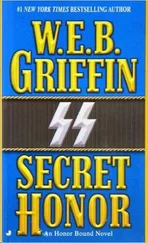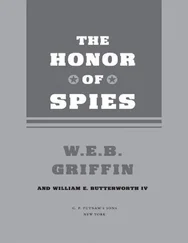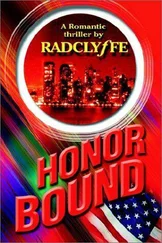“The end move in politics is always to pick up a gun.”
—R. Buckminster Fuller
To my family: Beth, Danny and Erin, for encouraging me to keep writing.
To my friends Pete and Tim for being sounding boards for my ideas.
Jason McKay adjusted his grip on the pistol, the tacky surface of his gloves holding it secure despite the sweat that soaked his palms beneath that material. The interior of the old storehouse was like a darkened broiler and his battle utilities were soaked beneath his body armor, rivulets of perspiration running down his face as he crouched behind the concrete solidity of a support pillar. This had gone on too long… the heads-up readout in his helmet was counting up past fifteen minutes since he’d entered the building and there was still at least one target inside, armed with an assault rifle. He was running out of time.
He winked his right eye and the shadowed recesses of the warehouse interior brightened into a two-dimensional, green-tinted maze of stacked cargo containers, each of the square, plastic boxes labeled with some arcane numeric designation next to their computer code. None of them showed anything on thermal and he saw no heat sources visible anywhere other than a few glowing power outlets. But he knew they were here… and they knew he couldn’t wait forever.
Drawing in a deep breath, McKay threw himself from behind the support column and rolled forward across the aisle as a burst of automatic fire cratered the pillar in a spray of concrete, then drilled into the floor inches behind him. He took cover behind a line of cargo boxes, flinching as the rifle fire tore into them just above his head. But now he knew where the gunman was: the fire had come from above, from the landing of the stairs up to the loader control room.
Getting to the stairs would mean crossing twenty meters of open ground… and that would be suicide. McKay glanced above him, then holstered his handgun and leaped upwards to grab the next shelf of cargo containers. Grunting with the effort of lifting his own eighty kilos plus another ten of body armor, he pulled himself hand over hand to the top shelf, then levered himself onto the topmost cargo container. Scrambling forward onto his belly, he drew his pistol from its drop holster and high-crawled down the line of boxes, their hard, ridged surfaces clunking awkwardly against his leg armor and elbow pads.
Now he could see a thermal source… human-shaped, through the window of the control room, part of the elbow sticking out the doorway as it aimed the rifle downward, waiting for McKay to show himself again. McKay cursed silently… he had no good shot from this angle. The doorframe shielded the shooter’s torso and head and he wasn’t sure his handgun rounds could penetrate the wall material. He looked around him, then felt at his belt, fishing a spare magazine from the pouch at his waist. Rising up on his right elbow and right knee, he threw the magazine as hard as he could across the room to the right. It clattered noisily against the far wall and he was already on his feet as the gunman turned the barrel of his rifle and his attention to that direction. McKay jumped from one cargo crate to the next with broad strides until he reached the end of the row, only three meters from the suspended claws of the cargo loader arm hanging from the ceiling.
Gritting his teeth, McKay threw himself across the gap, catching the upper mandibles of the loader arm with his left hand, while his feet found purchase on the lower pair, his knees flexing to absorb the shock. The Gomer with the rifle heard the metallic clank as the loader arm wobbled under his weight and he swung the short-barreled bullpup weapon around, but McKay was still moving, leaping off the loader onto the stairway landing, firing his outstretched handgun in midair.
The targeting reticle in his helmet HUD was connected to the sight of his pistol, but there was no time to focus on it; instead, McKay aimed by instinct, the large-caliber auto bucking in his hand as the floor of the landing swiftly came up to meet him. McKay took the landing in a shoulder roll, coming to his feet over the falling body of the gunman and pumping two more rounds into him before he fell into a crouch in the doorway, scanning for more targets. Before he could turn the whole 360 degrees, a blast of gunfire sounded from behind him and he spun around, throwing himself to the floor.
He saw a rifleman in the mottled grey armor and dark-visored helmet of the enemy slumped to the ground, his carbine clattering on the hard floor. Behind him stood a slim, curved figure in the darker fatigues and armor that he shared, a handgun similar to his own held outstretched in a classic tactical stance. It was obvious that both the shooter and the victim had come in on the other side of the control room through a now-open door that led to the outside, a moonlit sky barely visible through it.
“Thanks,” McKay said, breathing heavily as the adrenaline began to flow out of him. Before the word was out of his mouth, the counter in his HUD ran out and an alarm horn went off above them…
“Simulation ended, time has expired,” a voice sounded through his helmet speakers. “Colonel McKay and Major Stark have successfully completed Scenario Seven. Congratulations, sir, ma’am.”
The lights of the room came up and McKay sighed with relief as the climate control kicked in, bringing the temperature and humidity down. He pulled off his helmet and the illusions it had sustained abruptly ended: the “night sky” outside the open door had changed into a blank wall in the middle distance, the dilapidated look of the “warehouse” disappeared along with the bullet-holes in the walls and cargo containers, and the wounds on the downed enemies—and the pools of blood around them—faded away even as the two men rose to their feet, laughing.
“Damn, Colonel,” the one he had shot said, chuckling ruefully. “That was an awesome move… but you could have broken your neck!” He pulled off his helmet, revealing a sharp-angled, freckled face and a scalp-short brown buzz cut.
“You fight how you train and you train how you fight, Vinnie,” Colonel McKay reminded him, unfastening his body armor and letting it drop to the floor. Aside from cushioning you from impacts, it had the detrimental effect of immobilizing you if you were shot in the simulation. A small swarm of enlisted personnel came out from behind previously-invisible doors to collect the armor and the special simulator weapons.
“Is that why I got the drop on you, sir?” the other man cracked in a strong Australian accent, running a hand over his sweat-matted blond hair as he rose to his full meter-nine height.
“I wasn’t worried about you, Jock,” McKay said, smiling. “I knew she had my back.”
She was a tall, athletic woman, with shoulder-length golden-red hair, green eyes and a strong-chinned, high-cheekboned face that still took his breath away after six years. She smirked as she tossed her armor on the floor next to McKay’s.
“Yeah,” she said with just a hint of her native Irish accent. “We planned it that way… but you’ll note that my part of the plan didn’t involve jumping off any freight-loaders, Jason.”
“Shannon, I know better than anyone that no plan survives contact with the enemy.” McKay cocked an eyebrow. “Even when the enemy is our friends.” He slapped Vinnie on the shoulder. “Hell, especially when it’s these guys. They still get paid to do this stuff… you and I spend most of our time in meetings or buried in scout reports. Thanks,” he nodded to a Technician Second Class as the young man handed them water bottles. He downed about half the bottle, and then poured the rest over his head, sighing deeply.
Читать дальше
